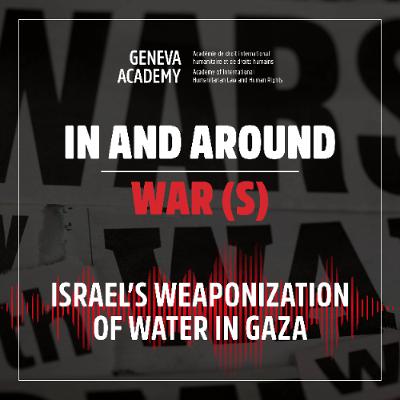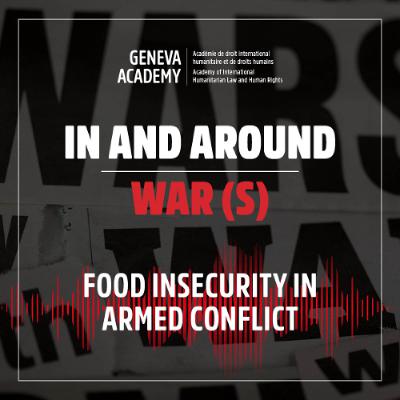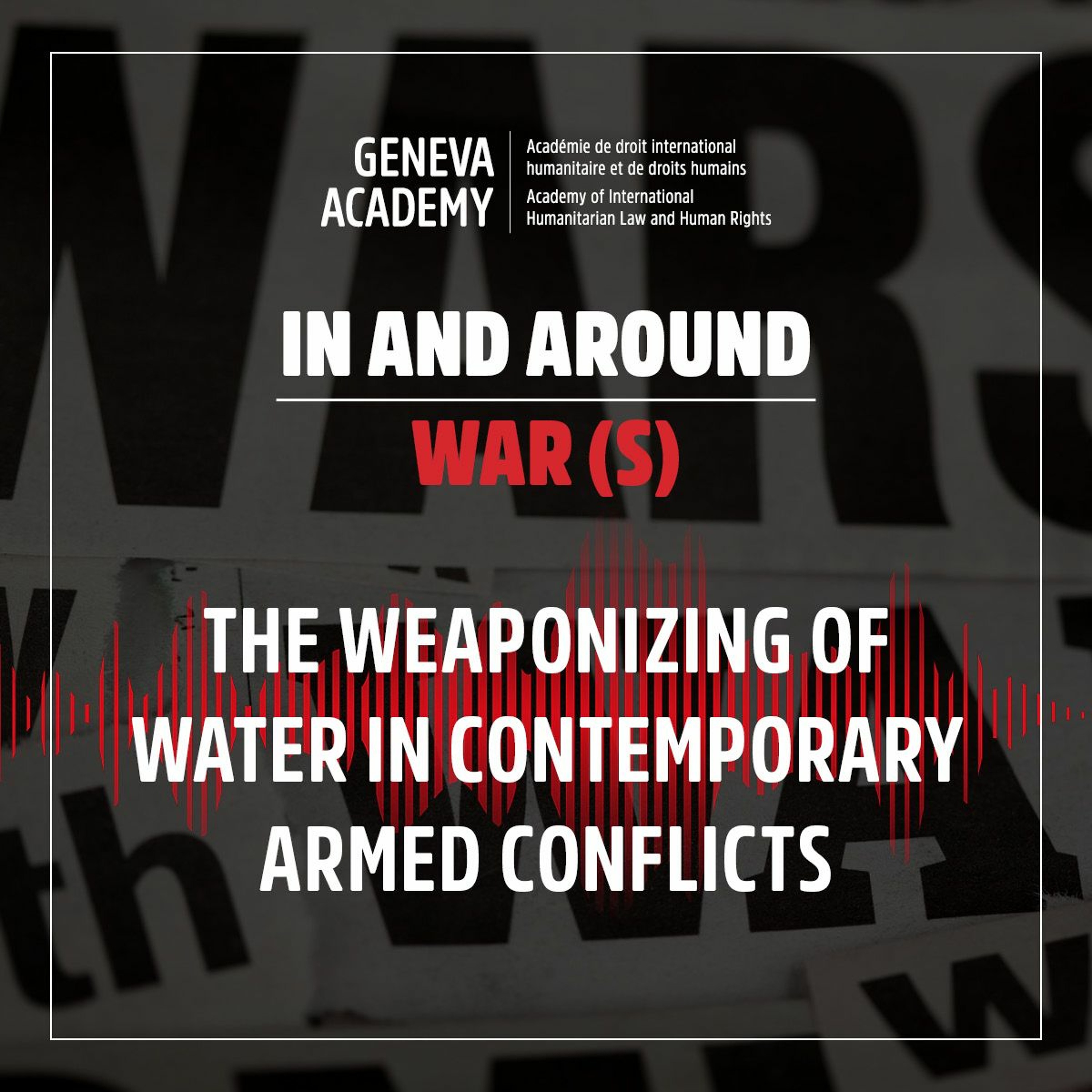Discover In and Around War(s)
In and Around War(s)

In and Around War(s)
Author: Geneva Academy of International Humanitarian Law and Human Rights
Subscribed: 25Played: 166Subscribe
Share
© All rights reserved
Description
In and Around War(s) focuses on contemporary legal issues related to wars. Each episode discusses issues relating to wars with Geneva Academy alumni, who use the law as a powerful shield to protect peace, human dignity and non-discrimination, bring justice and alleviate human suffering during armed conflicts.
16 Episodes
Reverse
Cyberspace is increasingly used for war related purposes. But does international humanitarian law apply to cyber operations? In the season�s 2 last episode, Paola Gaeta and Ana Srovin Coralli host a very special guest � Antonio Coco, a Lecturer in International Law at the Essex University and an alumnus of the Geneva Academy � and an usual co-host of this podcast. They discuss inter alia which kind of cyber operations may be carried out in war, when a cyberattack can amount to an armed attack against a state, and whether there is a need for new rules which would be better placed to address the realities and challenges brought about by attacks in cyberspace.
Links
- Essex Award for Outstanding Early Career Researcher: Antonio Coco discussed his work https://vimeo.com/830392101
- The Oxford Process on International Law Protections in Cyberspace https://www.elac.ox.ac.uk/the-oxford-process/
- United Nations Open-ended Working Group I https://disarmament.unoda.org/open-ended-working-group/
- United Nations Open-ended Working Group II https://meetings.unoda.org/meeting/57871/documents
- The Digitalization and Armed Conflict: a research project of the Geneva Academy https://www.geneva-academy.ch/research/our-clusters/digitalization-and-new-technologies/detail/78-the-digitalization-of-armed-conflict
- Societal Risks and Potential Humanitarian Impact of Cyber Operations https://www.geneva-academy.ch/joomlatools-files/docman-files/working-papers/Societal%20Risks%20and%20Potential.pdf
- Protecting Societies: Anchoring a New Protection Dimension in International Law in Times of Increased Cyber Threats https://www.geneva-academy.ch/joomlatools-files/docman-files/working-papers/Protecting%20Societies%20-%20Anchori.pdf
- The Future Digital Battlefield and Challenges for Humanitarian Protection: A Primer https://www.geneva-academy.ch/joomlatools-files/docman-files/working-papers/The%20Future%20Digital%20Battlefield%20.pdf
Follow and contact us at:
https://www.geneva-academy.ch/;
https://twitter.com/Geneva_Academy.
Credits for the production go to Margherita Capacci, Nathalie Mivelaz Tirabosco and Antonio Coco.
Hunger, starvation and famine are silent tragedies of wars. Limited or no access to food has often a devastating impact on civilian populations, and is one of the leading causes of death in armed conflict. Starvation has been used as a method of warfare despite clear prohibitions under international humanitarian law and international criminal law. But how much attention has been given to this issue in the past years? Have we seen any improvement? What are the most acute challenges with regard to hunger and armed conflicts that the international community is facing?
In this episode, the co-hosts Antonio Coco and Ana Srovin Coralli discuss the many challenges related to food insecurity in war with Brian Lander, the Deputy Emergency Director of the World Food Programme and an alumnus of the Geneva Academy�s Executive Master in International Law in Armed Conflict.
Links
- United Nations World Food Programme https://www.wfp.org/
- United Nations Security Council Resolution 2417 (2018) https://digitallibrary.un.org/record/1627380?ln=en
- IHL Talk: Starvation and Armed Conflict https://www.geneva-academy.ch/event/past-events/detail/147-starvation-and-armed-conflicts
- Research Brief: Harmonizing War Crimes Under the Rome Statute
https://www.geneva-academy.ch/joomlatools-files/docman-files/Harmonizing%20War%20Crimes%20Under%20The%20Rome%20Statute.pdf
- Coco, de Hemptinne, Lander (eds), Special Issue on Starvation in International Law, 17(4) Journal of International Criminal Justice 2019
https://academic.oup.com/jicj/issue/17/4
Follow and contact us at:
https://www.geneva-academy.ch/;
https://twitter.com/Geneva_Academy.
Credits for the production go to Margherita Capacci, Nathalie Mivelaz Tirabosco and Paola Gaeta.
Mass surveillance and big data in wars highlight the tension between the protection of privacy and legitimate goals such as military necessity, documenting atrocities and support to humanitarian assistance.
In this episode, the co-hosts Paola Gaeta and Antonio Coco discuss the challenges of data protection and privacy in war with Ilia Maria Siatista, an alumna of the LLM program of the Geneva Academy of International Humanitarian Law and Human Rights and currently a Programme Director and Senior Legal Officer at Privacy International � a London based NGO. They talk about the mandate of Privacy International and specific issues that arise while engaging with private actors involved in mass data collection in warfare.
Links:
Privacy International, registered charity based in London that works at the intersection of modern technologies and rights: https://privacyinternational.org
Clearview AI and the War in Ukraine: https://www.clearview.ai/ukraine
Ilia Maria Siatisa, �Serious Violations of Human Rights. On the Emergence of a New Special Regime�, Oxford University Press: 2022
Follow and contact us at:
https://www.geneva-academy.ch/;
https://twitter.com/Geneva_Academy.
Armed groups and de facto authorities are key players in today�s armed conflicts: they directly impact civilian populations and pose an increasing global challenge. Non-governmental organizations such as Geneva Call engage and speak to them, in order to induce them to comply with the rules of international humanitarian law to enhance the protection of the civilian population caught in the midst of armed conflicts.
But does engaging with these groups and authorities actually make a difference to how the wars in which they participate are eventually being carried out?
In this first episode of the second season of 'In and Around War(s)�, Ezequiel Heffes, currently Director of the organisation called Watchlist, shares with us his rich experience of engaging with armed groups to ensure respect for international humanitarian law with the co-hosts Paola Gaeta and Ana Srovin Coralli.
Links
- Geneva Call, organisation engaging with armed groups to increase respect for IHL: https://www.genevacall.org/
- International Committee of the Red Cross, Restoring family links programme: https://www.icrc.org/en/what-we-do/restoring-family-links
- Watchlist, network of organisations that advocate for children in war zones: https://watchlist.org/
- Detention by Non-State Armed Groups under International Law, Cambrige University Press, January 2022: https://www.cambridge.org/core/books/detention-by-nonstate-armed-groups-under-international-law/64639EE42DAEF7CA410127E217F73D25
Follow and contact us at:
https://www.geneva-academy.ch/;
https://twitter.com/Geneva_Academy.
Credits for the production go to Margherita Capacci, Nathalie Mivelaz Tirabosco, and Antonio Coco.
International law provides for a distinct set of rules that fighters must abide by in war, known as �international humanitarian law�. How to effectively promote respect for such rules and ensure humanitarian protection for victims of war? And how to reconcile the aspiration to peace with the acceptance of rules regulating war?
In this episode, the co-hosts Paola Gaeta and Antonio Coco discuss the challenges and rewards of practising international humanitarian law with Nishat, an alumna of the Geneva Academy of International Humanitarian Law and Human Rights who has worked for years with the International Committee of the Red Cross (ICRC), including in conflict areas. They talk � among other things � about the ICRC�s mandate, the practice of talking to people involved in the war and the need for confidentiality.
Links
� What does the ICRC do: https://www.icrc.org/en/what-we-do
� Q&A on the ICRC�s practice of confidentiality: https://www.icrc.org/en/document/confidentiality-q
� ICTY, Prosecutor v Simic et al., �Decision on the Prosecution Motion under Rule 73 for a Ruling concerning the Testimony of a Witness�, 27 July 1999 (on the right to non-disclosure of information relating to the ICRC�s activities in the possession of its employees in judicial proceedings): https://www.icty.org/x/cases/simic/tdec/en/90727EV59549.htm
Follow and contact us at:
https://www.geneva-academy.ch/;
https://twitter.com/Geneva_Academy.
Copyright:
Credits for the production go to Tatiana Avanthay, Nathalie Mivelaz Tirabosco and Ana Srovin Coralli.
The worst forms of business-related abuses often happen in the context of war or in conflict-affected areas.
In Episode 4 of the podcast �In and Around War(s)�, the co-hosts � Paola Gaeta and Ana Srovin Coralli � discuss some burning legal issues in relation to business and war with S� Benjamin Traore, who is an Assistant Professor at Mohammed VI Polytechnic University in Rabat, Morocco, and an alumnus of the Geneva Academy of International Humanitarian Law and Human Rights.
They focus in particular on the African context, and examine the role of businesses in the perpetration of international crimes, business complicity in the commission of war crimes, and whether international humanitarian law and international human rights law impose obligations on businesses during wars.
Links
- UN Guiding Principles on Business and Human Rights : https://www.ohchr.org/Documents/Publications/GuidingPrinciplesBusinessHR_EN.pdf
- Protocol on Amendments to the Protocol on the Statute of the African Court of Justice and Human Rights (�Malabo Protocol�): https://au.int/en/treaties/protocol-amendments-protocol-statute-african-court-justice-and-human-rights
- Lafarge case: Cour de cassation (France), judgment of 7 September 2021, overturning the 2019 lower court decision that dismissed charges against Lafarge for complicity in crimes against humanity and the charges over endangering the lives of others: https://www.dalloz.fr/documentation/Document?id=CASS_LIEUVIDE_2021-09-07_1987367&ctxt=0_YSR0MD1sYWZhcmdlIGNyaW1lcyBjb250cmUgbCdodW1hbml0w6nCp3gkc2Y9c2ltcGxlLXNlYXJjaA%3D%3D&ctxtl=0_cyRwYWdlTnVtPTHCp3MkdHJpZGF0ZT1GYWxzZcKncyRzb3J0PSNkZWZhdWx0X0Rlc2PCp3Mkc2xOYlBhZz0yMMKncyRpc2Fibz1UcnVlwqdzJHBhZ2luZz1UcnVlwqdzJG9uZ2xldD3Cp3MkZnJlZXNjb3BlPUZhbHNlwqdzJHdvSVM9RmFsc2XCp3Mkd29TUENIPUZhbHNlwqdzJGZsb3dNb2RlPUZhbHNlwqdzJGJxPcKncyRzZWFyY2hMYWJlbD3Cp3Mkc2VhcmNoQ2xhc3M9#texte-integral
Follow and contact us at:
https://www.geneva-academy.ch/;
https://twitter.com/Geneva_Academy.
Copyright:
Credits for the production go to Tatiana Avanthay, Nathalie Mivelaz Tirabosco and Antonio Coco.
Non-governmental organizations (NGOs) play a significant role in contributing to the rule of law during and in post-war contexts. Their presence, activities and support � including through advancing human rights and criminal justice agendas � can make a real difference for people.
In Episode 3 of the podcast �In and Around War(s)�, the co-hosts � Antonio Coco and Ana Srovin Coralli � discuss the role of NGOs in war with Ilya Nuzov, Head of the Eastern Europe and Central Asia Desk at the International Federation for Human Rights (FIDH) and an alumnus of the Geneva Academy of International Humanitarian Law and Human Rights.
Together, they discuss the role, work, challenges and key potential of NGOs in war contexts. They focus, in particular, on the activities carried out by FIDH, including documentation, litigation, advocacy and dissemination regarding international crimes and serious violations of human rights in twar-related situations.
Links
Geneva Academy�s IHL Talk, The Wagner Group: Options for Justice
International Federation of Human Rights, https://www.fidh.org/en/
Follow and contact us at:
https://www.geneva-academy.ch/;
https://twitter.com/Geneva_Academy.
Copyright:
Credits for the production go to Tatiana Avanthay, Nathalie Mivelaz Tirabosco and Paola Gaeta.
Universal jurisdiction offers a promising ground for prosecuting perpetrators of international crimes, including war crimes, particularly in cases where there is a huge risk of impunity. With the Russian invasion of Ukraine and the opening of multiple domestic investigations for related crimes, the relevance of universal jurisdiction has become more evident than ever.
In this Episode 2 of the podcast series �In and Around War(s)�, the co-hosts � Paola Gaeta and Ana Srovin Coralli � discuss the relevance of universal jurisdiction for prosecuting international crimes with Philip Grant, founder and Director of Trial International and an alumnus of the Geneva Academy of International Humanitarian Law and Human Rights.
The conversation touches upon the definition and rationale for universal jurisdiction, the requirements and key challenges arising in prosecuting international crimes on this basis, the recipe for a �successful practice� of universal jurisdiction in some states (e.g. Germany) and the reasons behind the opposition to this notion by some countries.
Links
Trial International, Universal Jurisdiction Annual Review 2022: https://trialinternational.org/universal-jurisdiction-tools/
Follow and contact us at:
https://www.geneva-academy.ch/;
https://twitter.com/Geneva_Academy.
Copyright:
All rights go to Radio Cooperativa: https://www.cooperativa.cl/ for the Pinochet arrestation audio clip.
Credits for the production go to Tatiana Avanthay, Nathalie Mivelaz Tirabosco and Antonio Coco.
The years 2000 started with the so-called �global war on terror�, in the aftermath of the 9/11 attacks. The use of armed force against non-state armed groups labelled as �terrorists� has, over the years, become more and more common � and continues to pose important legal and ethical questions.
In this episode, the co-hosts � Paola Gaeta and Antonio Coco � explore the relationship between terrorism and war in a conversation with Gloria Gaggioli, current Director and alumna of the Geneva Academy of International Humanitarian Law and Human Rights. They discuss how to identify members of armed groups which are labelled as �terrorists�, what rules apply to the fight against them, the practice of so-called �targeted killings�, the theory of the �global battlefield�, and whether the �terrorism� label adds anything to the legal assessment of the fight.
Links:
- ICRC, Guidance on Direct Participation in Hostilities, 2009: https://www.icrc.org/en/war-and-law/contemporary-challenges-for-ihl/participation-hostilities
- �Counter-Terror Project: a Legal Empirical Approach�, directed by the guest of this episode, Professor Gloria Gaggioli: https://counter-terror-project.org/
- Speech by the United States President, G.W. Bush, announcing the �global war on terror�, Address to a Joint Session of Congress, 20 September 2001.
https://commons.wikimedia.org/wiki/File:Bush_Addresses_Congress_9-20-01.ogg
Follow and contact us at:
https://www.geneva-academy.ch/;
https://twitter.com/Geneva_Academy.
Credits for the production go to:
Tatiana Avanthay, Nathalie Mivelaz Tirabosco and Ana Srovin Coralli.
The co-hosts Paola Gaeta, Antonio Coco and Ana Srovin Coralli introduce the new podcast In and Around War(s) on contemporary issues related to war.
Each episode will feature a conversation with an alumnus or alumna of the Geneva Academy of International Humanitarian Law and Human Rights on topical issues like terrorism, universal jurisdiction or the role of NGOs in war(s).
In relation to the podcast�s focus and title, Andrew Clapham, a Professor at the Geneva Graduate Institute and a member of the Geneva Academy Faculty, provides insights on the contemporary significance of the term �war� as opposed to �armed conflict�, as discussed in his book War (Oxford University Press, 2021).
For more resources on war(s), visit the Geneva Academy�s website: https://www.geneva-academy.ch/.
Less than a toilet flush: In Gaza, people survive on just 4–8 liters of water a day. This episode provides a legal analysis of Israel’s weaponization of water against civilians
In this episode, host Juliette Graf speaks with Stuart Casey-Maslen (Geneva Academy), Dr. Elvina Pothelet (Diakonia IHL Centre), and Lama Abdul Samad (Oxfam), bringing together legal expertise, humanitarian perspectives, and field documentation to examine how Israel has turned water into a weapon against Palestinians in Gaza.
Further reading:
IHL in Focus Spot Report:
Water Crisis in War and Under Occupation: Current Israeli Policy and Practice in Occupied Palestinian Territory under International Humanitarian Law:
https://www.geneva-academy.ch/joomlatools-files/docman-files/IHL%20Spot%20Report%20-%20Water%20Crisis%20in%20War%20and%20Under%20Occupation.pdf
Oxfam Briefing:
Water War Crimes: How Israel has weaponised water in its military campaign in Gaza
https://policy-practice.oxfam.org/resources/water-war-crimes-how-israel-has-weaponised-water-in-its-military-campaign-in-ga-621609/
International Humanitarian Law Centre Report:
A Legal Appraisal of Israel’s Purported Aid Delivery Scheme in Gaza
https://www.diakonia.se/ihl/news/a-legal-appraisal-of-israels-purported-aid-delivery-scheme-in-gaza/
Editing: Tim Young
In this episode of the In and Around War(s) podcast, Yousuf Syed Khan, Nonresident Senior Fellow at the Atlantic Council, joins Academy Research Fellows Eugénie Duss and Francesco Romani to discuss the legal issues surrounding food security in armed conflict, as explored in our recent IHL in Focus Spot Report on Food Insecurity in Armed Conflict and the Use of Siege-Like Tactics.
After examining IHL rules on starvation, objects indispensable to the survival of the civilian population, and humanitarian assistance, they address current developments and prospects for their enforcement at the international level, particularly in relation to the work of fact-finding commissions, the International Criminal Court, and the International Court of Justice.
This year marks the 75th anniversary of the Geneva Conventions. Do they address the realities of modern warfare? Are they to blame when violations occur? And do they really justify killing? In the latest episode of our podcast series ‘In and Around War(s)’, we delve into these frequently formulated questions by putting the Geneva Conventions on trial.
The latest episode of 'In and Around War(s)' was co-produced with Janet H. Anderson and Stephanie van den Berg from the Asymmetrical Haircuts podcast, who lead the discussion by presenting three charges against the Geneva Conventions. Acting as defenders are Andrew Clapham, Professor of International Law at the Graduate Institute, and Gloria Gaggioli, Associate Professor and Vice-Dean of the Law Faculty at the University of Geneva. The verdict is ultimately delivered by Francesco Romani, Research Fellow at the Geneva Academy.
The latest episode of our 'In and Around War(s)' podcast follows on from the IHL Talk 'The Prosecution of Ecocide and Other Environmental Crimes: State of the Law and Way(s) Forward' which took place in April.
In the episode our Research Fellow, Eugénie Duss, speaks to Jelena Aparac, from UN SWTP, and Stavros-Evdokimos Pantazopoulos, from of the Erik Castrén Institute at the University of Helsinki. The discussion covers the recent and ongoing proceedings addressing climate change outside the criminal framework, focusing in particular on the case of Verein Klimaseniorinnen Schweiz and others v. Switzerland. It also covers the request for an advisory opinion on climate change before the International Tribunal for the Law of the Sea, and also the worrying tendency of the investor-state dispute settlement system to award large compensations to investors against states that adopt stricter environmental and climate change measures.
Following on from the discussions that took place during the recent IHL Talk on ‘The Weaponizing of Water in Contemporary Armed Conflicts’, Dr Eugenie Duss, researcher at the Geneva Academy speaks to Mark Zeitoun, Director General, Geneva Water Hub and Professor of Water Diplomacy, Geneva Graduate Institute, and Abby Zeith, Legal Adviser, Arms and Conduct of Hostilities Unit, Legal Division, International Committee of the Red Cross.
Subjects covered in the episode include role of expert engineers in decision processes related to the targeting of water during hostilities, the historical and contemporary use of water as a weapon, and the need for more research around these topics. The guests were also able to frame the issues in the context of their current roles and give some examples of positive developments in the legal work that is going into preventing the use of water as a weapon.
A new season of our podcast In and Around War(s) will launch soon with a series of discussions on topical issues related to the law around armed conflicts. This third season welcomes a new host, Research Fellow Eugénie Duss, who will meet with experts on a range of subjects related to the work of the Geneva Academy.




















